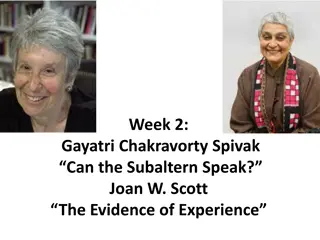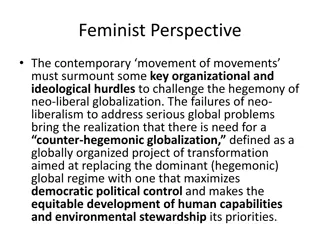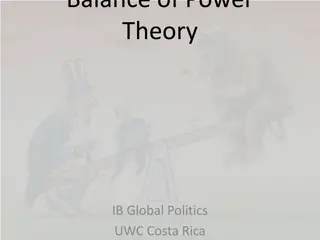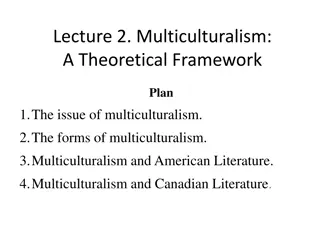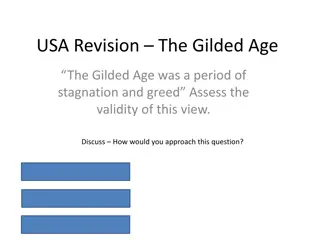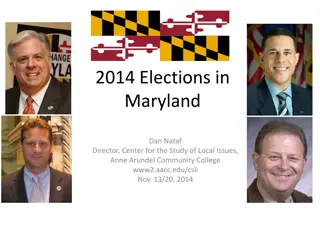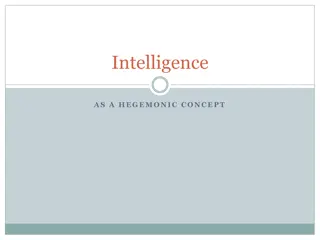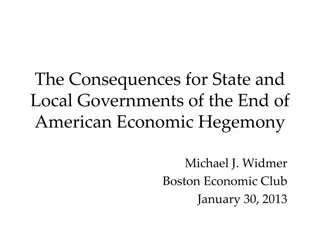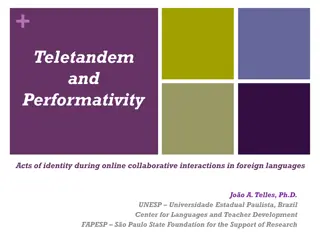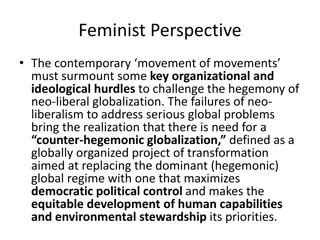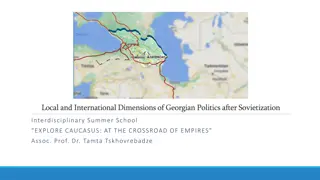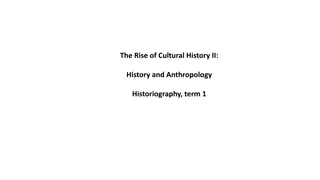Understanding Gramsci's Political Theory and its Relevance Today
Gramsci's political theory, focusing on concepts such as hegemony, historical bloc, and the role of intellectuals, offers valuable insights into contemporary political challenges. Explored through the lenses of Prof. Ken Spours and Stuart Hall's analytical tradition, this analysis sheds light on Con
0 views • 13 slides
Critical Perspectives on Postcolonialism and Structuralism in Spivak's Work
Gayatri Chakravorty Spivak is known for her critical engagement with postcolonial theory and deconstruction, challenging traditional Western perspectives. By drawing on thinkers like Derrida and Foucault, Spivak offers a unique lens to interrogate power dynamics, hegemony, and resistance. Her work r
0 views • 31 slides
Feminist Perspectives on Globalization Challenges
The contemporary feminist movement aims to challenge the hegemony of neo-liberal globalization by advocating for a counter-hegemonic approach that prioritizes democratic political control, equitable development, and environmental stewardship. Different feminist theoretical approaches address gender
0 views • 20 slides
Understanding Balance of Power Theory in Global Politics
Balance of Power Theory in global politics emphasizes the distribution of military capability among states to prevent hegemony and maintain national security. It is a realist theory that highlights the importance of preventing any single state from dominating others. The theory discusses how stronge
1 views • 15 slides
Gender-Based Violence Prevention and Gender Equality in the Nordic Context
The discussion focuses on the prevention of violence against women in the Nordic countries, exploring the concepts of gender-based, gender-neutral, and gender-blind approaches. The Istanbul Convention is highlighted as linking violence to gender equality, emphasizing the importance of feminist persp
0 views • 17 slides
Exploring Multiculturalism: Theoretical Framework and Implications
Multiculturalism is a complex concept encompassing diverse cultures in society, reflecting the postmodern reaction to cultural hegemony. Scholars like Bhikhu Parekh and James Trotman delve into the significance of multiculturalism in highlighting neglected histories and promoting respect for cultura
0 views • 26 slides
Examination of the Gilded Age in the USA
The Gilded Age in the USA was marked by political conservatism, economic growth driven by robber barons and corporations, and social challenges including urbanization, immigration, and nativism. The Republican Party's hegemony was influenced by big business support, but also faced opposition due to
0 views • 18 slides
Analysis of 2014 Elections in Maryland
The 2014 elections in Maryland revealed interesting trends, with divisions among Democrats in the governor's race and changes in the General Assembly. The Democratic hegemony in the Maryland General Assembly eroded but remained intact. Detailed statistics on various races and districts are provided,
0 views • 48 slides
Unpacking the Notions of Intelligence and Social Hegemony
This presentation delves into the complex concepts of intelligence and social hegemony, exploring historical perspectives, scholarly debates, and folk beliefs. It challenges the hegemonic nature of contemporary intelligence definitions and examines the power dynamics within civil society. Through a
1 views • 14 slides
Challenges for State and Local Governments Post-American Economic Hegemony
The shift in global economic dynamics signals challenges for state and local governments in the U.S., impacting their funding capacity for essential programs and services. Factors like global economic competition, job loss, middle-class erosion, aging population, unsustainable public benefits, wars,
0 views • 31 slides
Performativity Acts of Identity in Teletandem Collaborative Interactions
The research explores how individuals perform their identities during online collaborative interactions in foreign languages, focusing on Teletandem practices. It discusses concerns on access to language education, digital literacy, and the hegemony of English, while highlighting the importance of d
0 views • 16 slides
Challenges and Evolution of Feminist Approaches to Globalization
The contemporary feminist movement faces organizational and ideological hurdles in challenging the hegemony of neo-liberal globalization. Feminist perspectives on globalization aim to address gender injustices with a focus on specific issues. Early feminist analyses were criticized for not consideri
0 views • 8 slides
Georgian Politics Post-Sovietization: Local and International Dimensions
Explore the complex political landscape of Georgia post-Sovietization with a focus on local and international influences. Delve into debates on empire-building, modernity, Soviet hegemony, and Georgian autonomy. Gain insights into the geopolitical shifts in the Caucasus in the early 20th century and
0 views • 11 slides
The Rise of Cultural History II: History and Anthropology Historiography
This content explores the concepts of cultural history, Marxist thought, cultural hegemony, and the works of Antonio Gramsci. It delves into the history of anthropology, discussing key figures such as Franz Boas and Malinowski, and highlights the intersection of anthropology and history in understan
0 views • 9 slides

